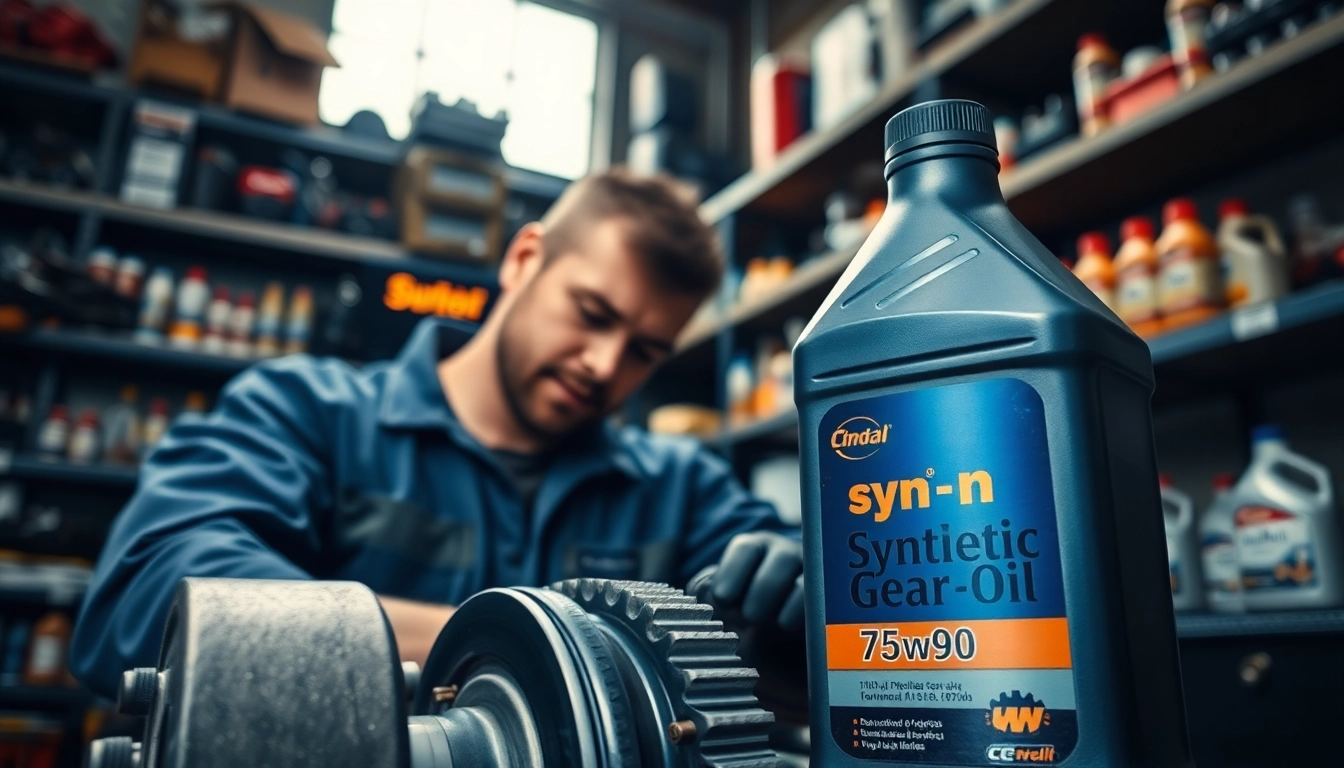Understanding Syn Gear Oil 75W90: What You Need to Know
In the world of automotive maintenance, proper lubrication is essential for ensuring optimal performance and longevity of vehicles. One critical component of this is the oil used for gear systems. Among the various gear oils available, syn gear oil 75w90 stands out as a popular choice for many vehicle owners. This article delves into the definition, benefits, applications, and much more regarding 75W90 synthetic gear oil.
Definition and Composition of Syn Gear Oil
Syn gear oil, specifically 75W90, essentially refers to a type of synthetic gear oil with a viscosity rating of 75 in low temperatures and 90 in high temperatures. The “W” indicates winter performance characteristics, making it suitable for diverse driving conditions. This oil typically consists of synthetic base stocks combined with a carefully formulated additive package. These additives may include anti-wear agents, detergents, and friction modifiers, which work together to enhance the oil’s lubricating properties and performance under load.
Key Benefits of Using 75W90 Gear Oil
Choosing 75W90 synthetic gear oil offers numerous advantages:
- Enhanced Protection: The advanced formulation provides excellent protection against wear, reducing the risk of gear failure over time.
- Improved Performance: Synthetic oils generally exhibit superior thermal stability and low-temperature fluidity, ensuring consistent performance across different driving conditions.
- Lubrication Efficiency: With lower friction coefficients, synthetic oils contribute to improved fuel efficiency.
- Longer Oil Life: Many synthetic oils last longer than conventional oils, which can lead to extended service intervals and reduced maintenance costs.
Applications in Automotive Mechanisms
75W90 synthetic gear oil is widely used in various automotive applications. It is particularly effective in:
- Manual Transmissions: It provides smooth shifting and reduces wear on the gears.
- Differentials: Ensures protection against extreme pressures and keeps gears operating smoothly.
- Transfer Cases: Offers reliable lubrication, particularly in all-wheel-drive and four-wheel-drive vehicles.
Comparing Syn Gear Oil 75W90 with Other Types
Differences Between Synthetic and Conventional Gear Oils
One significant decision in automotive maintenance is whether to use synthetic or conventional gear oils. Synthetic oils provide several advantages over their conventional counterparts:
- Thermal Stability: Synthetic oils maintain their viscosity better at extreme temperatures, providing consistent protection.
- Oxidation Resistance: They are less prone to forming sludge and deposits, contributing to cleaner internal components.
- Frictional Properties: Synthetic oils reduce friction more effectively, which enhances fuel efficiency and prolongs component life.
Performance Metrics and Ratings
The quality of gear oils can be gauged using several performance metrics, including viscosity index (VI), wear protection, and rust inhibition. 75W90 synthetic gear oils typically meet or exceed the API GL-5 specifications, ensuring they can handle the demands of high-load applications.
Choosing the Right Gear Oil for Your Vehicle
When selecting gear oil, consider the manufacturer’s recommendations outlined in your vehicle’s owner manual, which may specify the required viscosity and performance standards. Factors like driving style, load conditions, and environmental factors also play a role in determining the best oil for your vehicle.
How to Properly Use Syn Gear Oil 75W90
Step-by-Step Guide to Changing Gear Oil
Changing your gear oil is crucial for maintaining your vehicle’s performance. Here’s a step-by-step guide:
- Preparation: Park your vehicle on a level surface and raise it securely using jack stands. Gather your tools and materials.
- Drain the Old Oil: Locate the drain plug on your transmission or differential and remove it. Allow the old oil to drain completely into a suitable container.
- Replace the Drain Plug: Once drained, replace and tighten the drain plug to avoid leaks.
- Fill with New Oil: Locate the fill hole and use a funnel to add the new syn gear oil 75W90. Be careful not to overfill.
- Check Levels: Following the manufacturer’s specifications, check your oil levels to ensure proper amounts are present.
- Dispose of Old Oil: Properly dispose of the old oil at a recycling facility.
Tools and Safety Equipment Needed
Ensure you have the following tools and equipment before you start:
- Jack and jack stands
- Wrenches or sockets for drain plug removal
- Funnel
- Oil catch pan
- Disposable gloves for cleanliness
- Safety goggles for eye protection
Tips for Optimal Application and Maintenance
To ensure optimal performance from your gear oil:
- Always follow the manufacturer’s recommendations for viscosity and specifications.
- Regularly check fluid levels and conditions to catch potential issues early.
- Consider the driving conditions and adjust oil change intervals accordingly, keeping in mind severe driving conditions may necessitate more frequent changes.
Common Challenges and Solutions When Using Gear Oil
Identifying Gear Oil Leaks and Issues
Gear oil leaks can significantly impact vehicle performance. Key signs of leakage include:
- Fluid Puddles: Look for puddles of oily liquid under your vehicle.
- Squeaking Noises: Unusual noises during operation can indicate inadequate lubrication.
If you identify leaks, promptly locate the source and repair it to prevent further damage.
Understanding Gear Oil Viscosity and Its Implications
Viscosity is a critical determinant of a gear oil’s performance. The right viscosity ensures sufficient lubrication under various temperatures and loads. Using oil with inappropriate viscosity can lead to either sluggish operation in cold conditions or insufficient lubrication under heat.
How to Troubleshoot Gear Performance Problems
If you experience gear performance issues:
- Check the current gear oil level and quality—cloudiness or particles can indicate contamination.
- Inspect for any leaks that may cause oil loss.
- Consult a professional if problems persist, as they may require specialized tools or expertise.
Expert Recommendations for Choosing and Buying Syn Gear Oil 75W90
Best Brands and Products Available
Some of the top brands known for quality 75W90 gear oils include:
- Mobil 1: Renowned for its high-quality synthetic formulations.
- Valvoline: Offers a variety of formulations including options for high-stress applications.
- AMSOIL: Known for excellent protection in harsh operating conditions.
- Royal Purple: Specializes in high-performance synthetic oils.
Where to Purchase Gear Oil: Retail vs. Online
When it comes to purchasing gear oil, both retail and online options are available. Retail locations like auto parts stores often provide the advantage of immediate availability and the opportunity to consult with staff. Online shopping, on the other hand, can offer convenience and potentially lower prices. Compare options to find the best fit for your needs.
Final Thoughts on Maintenance Best Practices
Regular maintenance is key to vehicle longevity and performance. By using syn gear oil 75W90 and adhering to recommended oil change intervals, you can ensure that your vehicle stays in optimal working condition. Remember to consult your owner’s manual, stay informed about product innovations, and heed any maintenance alerts from your vehicle to promote a smooth driving experience.



